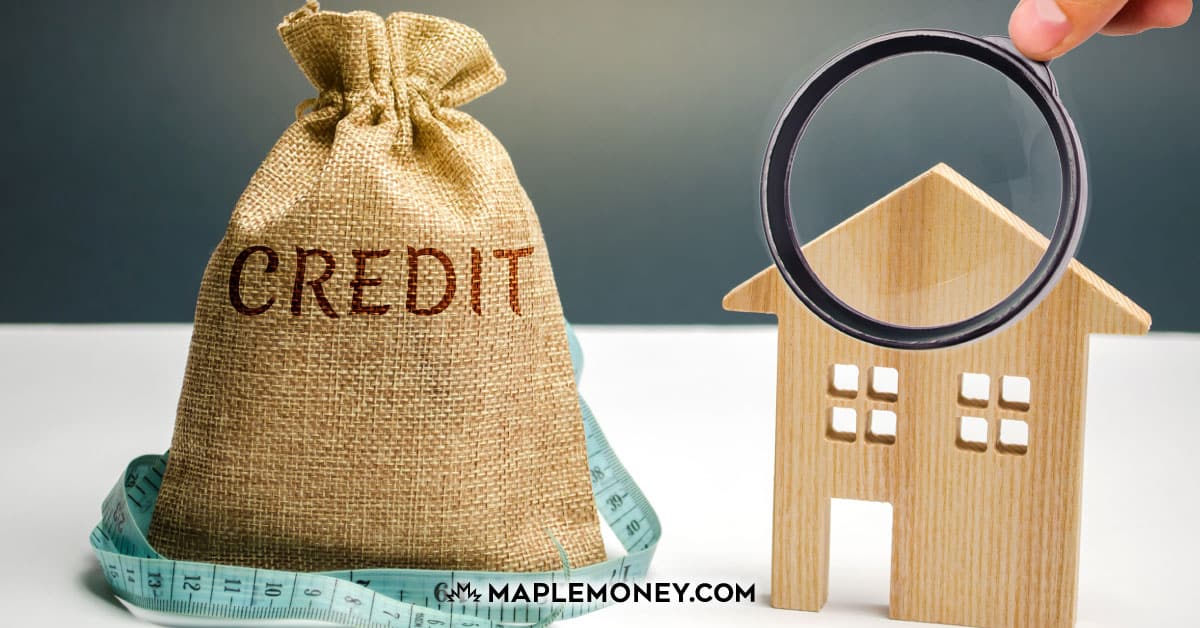What Credit Score Is Needed for a House?

According to CMHC, the share of new mortgage holders with credit scores below 660 in Canada has dropped significantly over the past decade, from 8.0% to less than 5% on a national basis. In the fourth quarter of 2021, the rate was 4.5%. While there may be several reasons for this, the evidence suggests that lending criteria are tightening.
We all know that having good credit is essential when you want to borrow money. But how good does your credit have to be to get a mortgage in Canada, and what kind of credit score do you need to have? This article will tell you what credit score you should shoot for and what options you have if you have a low credit score.
What Is Considered a Good Credit Score?
The majority of credit scores in Canada range between 500 and 800, with 500 considered poor and 800 or above excellent. I’ve broken the different ranges down below, and for more information, feel free to check out our guide to credit scores in Canada.
- 800 and over: Excellent
- 720-799: Very Good
- 650-719: Good
- 600-649: Fair/Average
- Under 600: Poor
How Can I Check My Credit Score?
If you’re unsure what your credit score is, you can obtain it from one of Canada’s two credit bureaus, Equifax and TransUnion. However, perhaps the easiest way is by signing up with Borrowell or Credit Karma. Both companies offer free credit monitoring and will send you a copy of your credit score and report every week via email. Borrowell will send you your Equifax score while Credit Karma deals with TransUnion.
Minimum Credit Score Required for Insured Mortgages
When you purchase a house in Canada with less than a 20% down payment, one of the following three companies must insure your mortgage: Canada Mortgage and Housing Corporation (CMHC), Sagen (formerly Genworth Financial), and Canada Guaranty. The coverage is called mortgage default insurance, often referred to as CMHC insurance.
All three insurers have a minimum credit score requirement – specifically, that at least one borrower must have a credit beacon score of 600 or higher. Of course, they always consider the overall strength of an application.
So, you could say that the minimum credit score required to buy a house is 600. Of course, the higher the score, the better your chances of being approved.
Minimum Credit Score for Conventional Mortgages
If you have a 20% downpayment or higher, you won’t be subject to CMHC’s minimum credit score requirements and can apply for a conventional mortgage. But that doesn’t mean that you will qualify.
Every mortgage lender has its own minimum credit score guidelines, and the rules may not always be hard and fast. But generally speaking, you’ll be hard-pressed to qualify for a mortgage with a credit score below 600, and in many cases, it will need to be higher.
Where Can I Get a Mortgage In Canada?
Most Canadians obtain their mortgage from one of Canada’s five major banks: RBC, TD Bank, Scotiabank, BMO, and CIBC. Credit Unions are another option, and you can also turn to a private mortgage lender if you have poor credit.
Major Banks
Generally speaking, Canada’s big banks require a higher credit score for mortgage approval than other institutions. Because banks take on the lowest risk, they can offer the lowest interest rates. If you prefer to deal with a major bank, you must demonstrate an above-average credit history and credit score.
Credit Unions
Like the big banks, credit unions can offer attractive interest rates on mortgages. But because they are willing to take on more risk than banks, you may be able to qualify with a lower credit score, providing that you have a stable income and employment history and the necessary down payment.
Private Mortgage Lenders
Private lenders are available for those who don’t have the minimum credit score needed to deal with a bank or credit union. You might even be able to get a mortgage with a credit score below 600.
The downside, however, is that your mortgage rate and mortgage payments will be much higher. Often people will take out a mortgage with a private lender for a short period (1 or 2 years) while getting their finances in order. When their credit score improves, they can move their mortgage over to a bank or credit union.
Mortgage Approval: Other Criteria
There’s more to the mortgage approval process than having a high credit score. All mortgage lenders require an adequate down payment, a reasonable debt to income ratio, and stable employment. All of these are an indication of financial stability.
Can You get a Mortgage with Low Credit?
Most lenders will require you to have good credit to obtain a mortgage, especially banks. If you have bad credit, your best bet is to approach a private mortgage lender. Just remember that your mortgage rate and mortgage payment will be higher.
If you don’t have a specific mortgage lender in mind or are unsure whether traditional lenders will approve your mortgage application, I recommend contacting a licensed mortgage broker. Mortgage brokers deal with dozens of financial institutions, and they can find a lender who will approve you with a slightly lower credit score.
Ways to Improve Your Credit Score
Bad credit shouldn’t be considered a financial death sentence. If you have a poor credit score, you can take steps to improve it. I’ve listed some of them below, but I recommend this article for more information on improving your credit score.
8 Steps Towards a Better Credit Score
- Pay all of your bills on time
- Pay down your existing debt
- Keep credit card balances low
- Avoid applying for additional credit
- Dispute inaccuracies in your credit report
- Alert lenders when you move
- Monitor your accounts online
- Don’t apply for a bunch of credit at once
Minimum Mortgage Credit Score: The Bottom Line
For a definitive answer to the minimum credit score required to get a mortgage in Canada, my answer would be 600. Anything under 600 is a total crapshoot. But Canada’s mortgage insurance companies will consider it, so that’s a good starting point.
Of course, the higher your credit score, the better your chances are. Also, higher credit scores translate to lower interest rates and lower mortgage payments. And that’s the most important thing, isn’t it?

